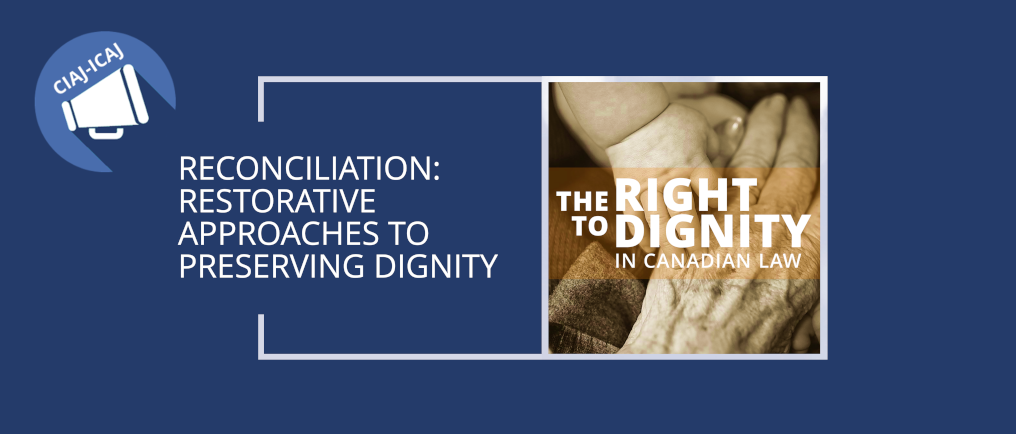Reconciliation: Restorative Approaches to Preserving Dignity

The Canadian legal system has begun to recognize and affirm Indigenous laws and legal orders. The restorative justice approach in Gladue has evolved into First Nation courts and community-based healing programs across the country. These Indigenous-oriented justice systems focus on Indigenous values and legal traditions through healing plans, sentencing circles, and peacemaking. However, many scholars maintain these courts do not include enough Indigenous input or control and argue that more independent Indigenous authority is needed for these courts to truly advance Indigenous peoples’ self-determination.
Reconciliation is an ongoing responsibility, for which settlers must confront the legacy of colonial erasure and assimilation. The Truth and Reconciliation Commission’s Calls to Action outline the constructive action required to repair the destructive impact of colonialism on Indigenous peoples. The healing process should not be decontextualized or individualized; instead, restorative approaches require governments to address the experience of Indigenous communities, including their resistance through activism and cultural pride.
Indigenous sovereignty extends beyond rebuilding the relationship between Indigenous peoples and settler-Canadians and must also include restoring their relationship with the natural world. Governments continue to allow multinational corporations to pursue natural resource projects on traditional Indigenous territories without the consent or partnership of the respective groups, effectively neglecting Indigenous peoples’ right to self-governance. The UN Decade on Ecosystem Restoration aims to work with marginalized groups most affected by the destruction and degradation of ecosystems and encourages the use of traditional Indigenous knowledge in the restoration process. Many landscapes were shaped by Indigenous traditions, and support for Indigenous environmental stewardship can help to promote ecological restoration.
The UN Declaration of the Rights of Indigenous Peoples (UNDRIP) provides the minimum standards required to achieve reconciliation, including the right of Indigenous peoples to govern their educational systems, the right to continue their cultural practices and teachings, and the right to have treaties recognized and respected. Although Canada has made progress toward advancing the rights of Indigenous peoples, such as the federal Indigenous Languages Act, for the most part, Indigenous community organizations are the ones pursuing revitalization efforts.
The UNDRIP also introduced Right to Free, Prior, and Informed Consent for any project affecting Indigenous lands or territories, a higher standard than common law’s “duty to consult”. How can the Canadian legal system implement Indigenous rights and legal traditions as set out in the UNDRIP? An Act respecting First Nations, Inuit and Métis Children, youth and families affirms an aspect of Indigenous self-governance by allowing Indigenous communities to govern their own child and family services. Children are the vehicle that maintain Indigenous communities’ cultures, languages, spirituality, laws, governance, and ways of life. How can Indigenous knowledge be incorporated into Canadian school curriculums to address the gaps that perpetuate ignorance and racism? As the lies surrounding historical, colonial narratives are brought to the surface, reconciliation demands a restorative approach to Indigenous sovereignty and decolonization. What can non-Indigenous people do to promote reconciliation and preserve Indigenous dignity?
These topics and more will be discussed at CIAJ’s 46th Annual Conference on “The Right to Dignity in Canadian Law,” which will take place October 26-28, 2022 in person in Halifax, NS, and Online.
Some seasoned panellists will be offering their expertise and personal experience on Panel 4, which will focus on restorative approaches to reconciliation that preserve the dignity of Indigenous peoples:
Panel Chair
- Adam O. Letourneau, K.C., Founder & Managing Partner, Letourneau LLP
Speakers
- Barbara Fallon, Ph.D., Full Professor, Associate Vice-President, Research & Canada Research Chair in Child Welfare, Factor-Inwentash Faculty of Social Work, University of Toronto
- Amber Crowe, Executive Director, Dnaagdawenmag Binnoojiiyag Child and Family Services (DBCFS), Hiawatha, ON
- Kristen Basque, RSW, Manager of Prevention Services, Mi’kmaq Family & Childrens Services of Nova Scotia
- Jessie Denny, Lawyer, Mi’kmaq Family & Childrens Services of Nova Scotia
Panel 4 keywords: United Nations Declaration on the Rights of Indigenous People, restorative justice, therapeutic jurisprudence, decolonization, national UNDRIP implementation, childcare, re-traumatization, and settlements; An Act Respecting First Nations, Inuit and Métis Children, Youth and Families, how different communities are trying to incorporate Indigenous laws and decisions into their child welfare system.
More blog posts on dignity are available on this page: https://ciaj-icaj.ca/en/blog/
Conference Overview
CIAJ’s 46th Annual Conference, entitled “The Right to Dignity in Canadian Law,” will discuss dignity as a fundamental human right. The conference will cover the many facets of the concept of dignity, from moral and philosophical notions to its uses as a legal norm. Discussion of the topic will be grounded in eminently pertinent issues such as the role of dignity in gender identity and reproductive rights, as well as medical assistance in dying, elder care, disability, and equality rights. The role of dignity will also be discussed in the context of the Canadian criminal justice and carceral systems, particularly with regards to Indigenous Peoples, restorative justice, the United Nations Declaration on the Rights of Indigenous Peoples, and reconciliation.
